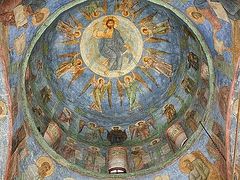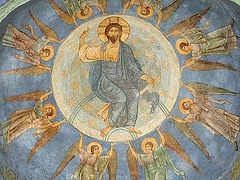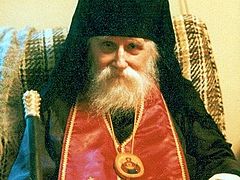The maturation of the Disciples
The feast of the Ascension of the Lord is always celebrated on the fortieth day after the feast of Pascha. Why? The answer to this can be read in the New Testament, in the book of the Acts of the Apostles (the Disciples of the Lord Jesus Christ), where it says that after His resurrection from the dead, Jesus Christ appeared to the Disciples for forty days and spoke to them about the Kingdom of God (cf. Acts 1, 3). And after that, He gathered the Disciples and gave them a command: Depart not from Jerusalem, but wait for the promise of the Father, which, saith He, ye have heard of Me. For John truly baptized with water; but ye shall be baptized with the Holy Ghost not many days hence… But ye shall receive power, after that the Holy Ghost is come upon you: and ye shall be witnesses unto Me both in Jerusalem, and in all Judaea, and in Samaria, and unto the uttermost part of the earth. And when He had spoken these things, while they beheld, He was taken up; and a cloud received Him out of their sight (Acts 1:4-5, 8-9).
The Ascension of Christ became a symbol of the “maturation” of the first Christian community—the closest disciples of Christ. The Lord taught them everything, and now they themselves must bring the light of Christian preaching on the Kingdom of God to the world. Now the Apostles are not just disciples, but also teachers. All of this applies to contemporary Christians. As we continue to be disciples of Christ, hearing His word through the Gospel, through the services, partaking of the Lord in the Sacrament of the Communion of His Body and Blood, we must share our faith and joy with others.
In the passage from the book of Acts, there is the very important and interesting word, “witness.” We are called to be witnesses of the glory of Christ, just as were His Disciples-Apostles. But if the Apostles were witnesses of all these events, and their preaching is a first-hand preaching, then how can we follow them? We not only can—we must. Otherwise, Christian preaching should have stopped with the death of the Twelve Apostles. But that didn’t happen. After all, the Lord tells the Disciples that their preaching will be accomplished by the power of the Holy Spirit. That is, God Himself will guide them. Therefore, one and the same Holy Spirit worked through the Apostle Peter—the closest disciple, and, we can say, the leader of all the other Apostles—and through the Apostle Paul, who was not a follower of Christ during His earthly life, but labored even harder at the work of preaching than did the others. The same Spirit of God works also in us, giving us the strength to be witnesses to Jesus Christ. After all, preaching is not just words—it is all the good that is done in the name of God: Let your light so shine before men, that they may see your good works, and glorify your Father Which is in Heaven (Mt. 5:16).
Christ’s day of glory
But still, it may seem that the Ascension is a mournful feast. If before this day we heard joyful Paschal hymns in church every day—“Christ is Risen from the dead, trampling down death by death, and upon those in the tombs bestowing life”—then now we have to wait an entire year for the next Pascha. But our joy mustn’t diminish. Indeed, and Holy Scripture itself and the Church hymns talk about how the Ascension was a day of joy for the Disciples of Christ (and that means, it should be for all of us). For example, we read in the Gospel of Luke that Jesus led the Disciples from Jerusalem to Bethany, and then He lifted up His hands, and blessed them. And it came to pass, while He blessed them, He was parted from them, and carried up into Heaven. And they worshipped Him, and returned to Jerusalem with great joy: And were continually in the temple, praising and blessing God (Lk. 24:50-53). Or in one of the main hymns for the feast—the troparion—we hear: “Thou hast ascended in glory, O Christ our God, granting joy to Thy disciples by the promise of the Holy Spirit. Through the blessing they were assured that Thou art the Son of God, the Redeemer of the world!”
The Ascension of the Savior is a manifestation of His Divine glory. The Savior was with God the Father as the Son of God, and now He is with the Father also as the Son of Man. The Apostle Paul expresses this idea quite precisely: Christ Jesus, Who, being in the form of God, thought it not robbery to be equal with God: But made Himself of no reputation, and took upon Him the form of a servant, and was made in the likeness of men: And being found in fashion as a man, He humbled Himself, and became obedient unto death, even the death of the cross. Wherefore God also hath highly exalted Him, and given Him a name which is above every name: That at the name of Jesus every knee should bow, of things in Heaven, and things in earth, and things under the earth; And that every tongue should confess that Jesus Christ is Lord, to the glory of God the Father (Phil. 2:5-11). The Son of God, being equal to the Father, humbles Himself; and renouncing His glory becomes a man—the most ordinary man, accepting suffering and death in disgrace. But God glorifies Him for it, giving Him the highest glory that no one can ever achieve. And the Disciples rejoice in this glory of their Teacher. Therefore, they don’t grieve that Christ is no longer with them. Yes, He is not among us physically, but He ever abides in the Church among the faithful. And we must also preserve this joy experienced by the Disciples on the day of the Ascension of Christ. For the Lord desires to share this glory with us.
The path to Heaven
The great Christian saint, ascetic, and author St. Maximus the Confessor said that Christ has already descended to us, and now we must ascend to Him. The feast of the Ascension of the Lord reminds us of the open road to Heaven. Heaven has always been a symbol of Divine majesty and glory. Christ united Heaven and earth, the earthly and the Heavenly, opening the path to God for us again. We have only to climb up the spiritual steps of the ladder that is the Lord Jesus Christ Himself.
There is one not quite correct understanding of Christianity as just an ancient tradition. Christianity doesn’t live in the past, but is ever directed ahead. When Fr. Alexander Men was asked what Christianity means for him, he answered: “I understand Christianity not so much as a religion that has existed for the past twenty centuries, but as a path to the future.” You can’t put it more precisely. Christianity isn’t the past, it’s the present and the future, because the Lord Jesus Christ is the same yesterday, and today, and for ever (Heb. 13:8). And we are all like the Apostles who stood and looked up as Christ ascended until a cloud concealed Him. But the Apostles didn’t remain there, standing with their heads raised up. We already know that they joyfully returned to Jerusalem; and after the day of Pentecost, when they were given the grace of the Holy Spirit, they went out to preach. Christianity is an incentive to action. Living here and now, we strive for the future.
But here is another very important and bright point of the Christian faith. We look forward to the coming of the Kingdom of God, when all evil will disappear from the world and creation will be renewed. But this future Kingdom, according to the word of Christ, comes to the heart of every believer here and now. The Kingdom of God is within you, says Christ (Lk. 17:21). During the Liturgy—the main service of the Church—the priest pronounces a prayer, which says that God did not leave us until He fulfilled everything: “Thou hadst brought us up to Heaven, and hadst bestowed upon us Thy Kingdom which is to come.” The Kingdom is coming, but already given to us here, at this very moment. And the path to this Kingdom—the Kingdom of Heavenly glory—is revealed nowhere else but in the human heart.
Ascending to Heaven, Christ calls us to follow after Him. Only, not in a while, but right now. He tells us: Rise above everything that separates you from the love of God, overcome the sin within you, conquer your shortcomings, multiply your gifts, show love and mercy. For in this is the Kingdom of God. For it stands not on the strength of weaponry or material well-being. No, this is the Kingdom of Christ, Who gave His life for man’s salvation.
Our sins raised Christ up upon the Cross, but God raised Christ up to the heights of His glory. And the Lord desires that we would share this glory with Him. Therefore, the feast of the Ascension of the Lord is a reminder of our personal ascension—our entrance into the Kingdom of God. We glorify the ascended Christ, hoping to see His glory already here, in our own hearts and souls.




